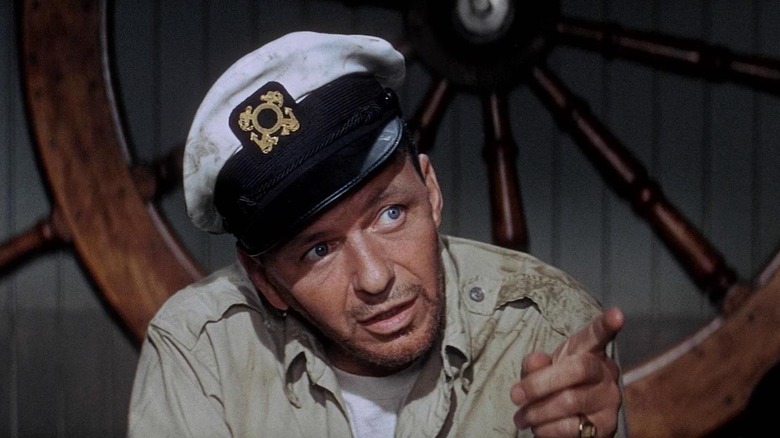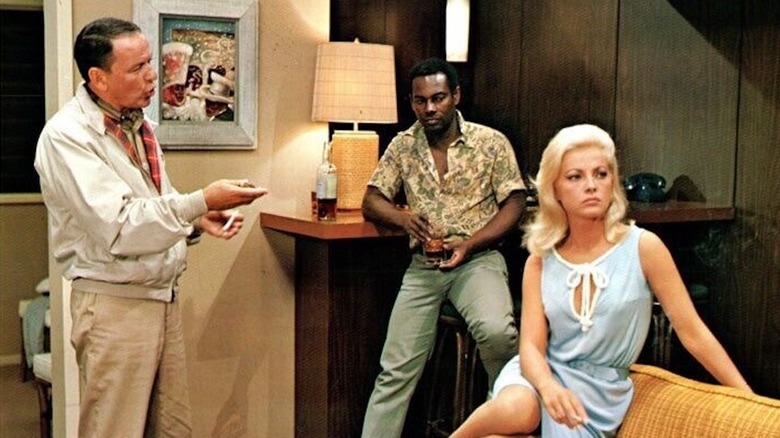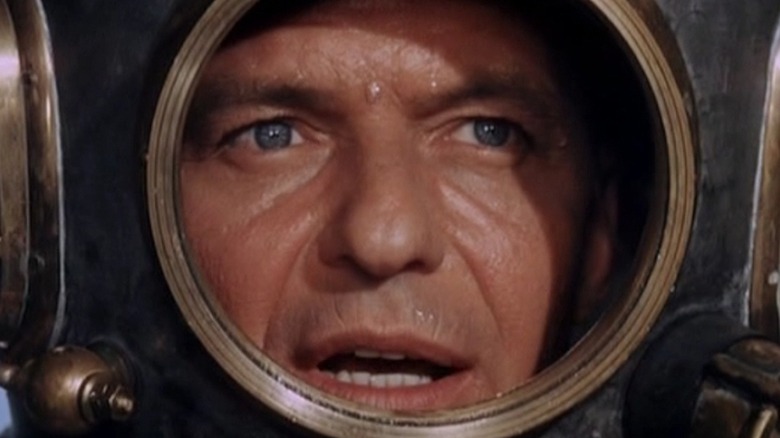The Twilight Zone's Rod Serling Wrote A Frank Sinatra Heist Film About Robbing The Queen Mary
Frank Sinatra went through phases like he went through wives. The legendary crooner and movie star could exhibit impeccable taste for what people wanted to see and hear, and then, in a few year's time, completely lose his grasp of the zeitgeist.
Sinatra was threatening to enter one of his down periods in the mid-1960s. The popular music scene was in the throes of Beatlemania, while moviegoers were tiring of the Rat Pack's antics. Who wanted to see Sinatra and the gang saunter their way through Western and gangster pastiches like "4 for Texas" and "Robin and the 7 Hoods" when they could watch Elvis Presley set the screen ablaze with Ann-Margret in "Viva Las Vegas"?
To be fair, Sinatra was still Sinatra, but after giving one of his finest performances in John Frankenheimer's "The Manchurian Candidate," he started playing it way too safe. Bud Yorkin and Norman Lear's adaptation of Neil Simon's amusing Broadway comedy "Come Blow Your Horn" was a hit, but you expected something more from the Chairman. Where was the spectacle?
It was in 1965's "Von Ryan's Express" in a big, big way. The Marc Robson-directed World War II actioner gave Sinatra his most satisfying star turn since Vincente Minnelli's "Some Came Running," and a box-office hit that reminded Hollywood that you can never count out Ol' Blue Eyes. After "Ocean's 11" and "Von Ryan's Express," Sinatra clocked that moviegoers loved watching him pull off a complicated caper, so he wasted no time in working up another impossible mission. And to bring it all together in rollicking fashion, he took a side trip to "The Twilight Zone."
Sinatra tells me he's happy with it
"The Twilight Zone" creator Rod Serling had just completed his fifth and final season of the series in 1964 when he signed on to adapt Jack Finney's bestseller "Assault on a Queen." Serling was, of course, more than a spinner of spooky tales. He'd won three consecutive Primetime Emmys in the 1950s for writing the television dramas "Patterns," "Requiem for a Heavyweight," and "The Comedian," and was now a Hollywood free agent.
On the surface, Serling seemed like an awful lot of writer for a goofy heist yarn about a group of high-seas bandits who commandeer a German U-boat to steal $1 million in cash from the RMS Queen Mary. But the convoluted setup had stymied previous scenarists, so Sinatra turned to one of the most highly regarded scribes in the business.
Serling gamely accepted the challenge, telling reporters who visited the film's set that "No one had been able to 'lick' the Jack Finney book." As for Serling's feelings about his take on the material, he deferred to the Chairman. "It had been tried several ways," he said. "But I decided to make it a straight adventure film and it seems to have worked out pretty well. At least, Sinatra tells me he's happy with it."
What did critics and moviegoers think?
There was no Sterling-and-Sinatra encore
"Assault on a Queen" is no "Von Ryan's Express." Whereas the latter a large-scaled, audience-wowing WWII adventure, the former is more of a soundstage-bound lark. Directed by the Sinatra-friendly (i.e. obedient) Jack Donohue, it feints at being a big movie, but the steady stream of process shots fail to transport. Serling's script is effective in that it rushes the viewer past the plot's difficult-to-swallow contrivances, but some of his dialogue feels like it might've been dictated by Sinatra (via Sammy Cahn). Describing his love interest Virna Lisi, the star remarks, "She's so deep in my gut, we breathe together."
"Assault on a Queen" was considered a significant step down from "Von Ryan's Express." "The picture is strictly predictable fore and aft," shrugged The New York Times' Bosley Crowther, "With the usual pre-robbery tensions and bickerings." The film did passable box office, but audiences correctly sniffed out a half-hearted effort from the Chairman.
The most remarkable element of the movie in retrospect is not Sinatra's presence nor Serling's script, but the score from Duke Ellington. This was the third of only four scores from the greatest American composer of the 20th century, and it's a jarringly swingin' affair. The music is splendid on its own, but as background for a muscular heist flick, it's way too laid back. Then again, Ellington had to leave the project to go on tour before he finished, so maybe he had his version of Elmer Bernstein's "The Great Escape" theme in the works. We'll never know because the masters were destroyed.


